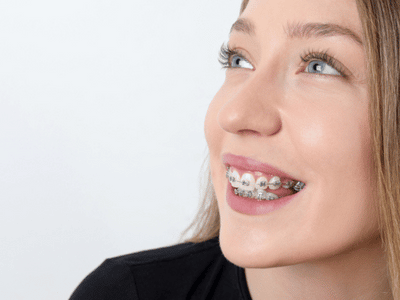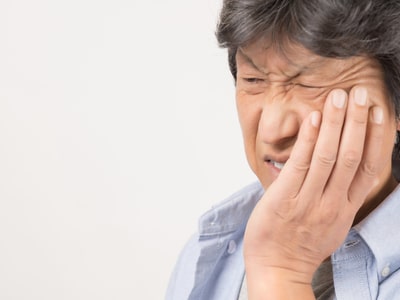
Luckily, we’re here to help and answer any questions you may have during treatment! If you keep these in mind, your smile and diet will be happy and healthy!
Greater Houston Orthodontics – Invisalign and Braces for All Ages
Orthodontist Houston TX Invisalign Braces | Greater Houston Orthodontics

Luckily, we’re here to help and answer any questions you may have during treatment! If you keep these in mind, your smile and diet will be happy and healthy!

Age seven is the magic number for a first orthodontist visit. This is because, at seven, your child’s first set of molars should have come in. This first set of molars erupts between ages six and seven and is the first set of permanent teeth your child will get. These teeth are in the lower jaw and do not replace any baby teeth.
The seven-year molars are a good indicator of future dental issues once they have fully grown in. This allows your orthodontist to get a more accurate picture of your child’s mouth and treatment plan than if they were seen before the molars grew in but give them enough time to address possible issues before it’s too late.

Also known as periodontal disease, gum disease is an infection of the tissues that hold your teeth in place. The culprit for this disease is usually poor brushing and flossing habits. These poor habits allow plaque – a sticky film of bacteria – to build up on the teeth and harden.Our mouths are full of bacteria. These bacteria help to form plaque on our teeth. Brushing and flossing help to get rid of plaque. The plaque that is not removed by these practices hardens and forms “tartar” that brushing doesn’t clean. This tartar can only be removed by a dentist or dental hygienist. If the disease worsens, it can lead to sore, bleeding gums, painful chewing problems, and even tooth loss.
There are risk factors for gum disease, but smoking is the most significant. Other risk factors include hormonal changes in women, diabetes, and medications that lessen the flow of saliva.

For adults tackling the dating scene with braces, whether enjoying a glass of wine is allowed is a question many ask. Alcohol isn’t something you think of as being full of sugar, but many drinks have deceptively high sugar content. This excess sugar is attractive to bacteria, and those bacteria leave behind enamel-eating acids. Alcohol has a high acid content as well. Mixed drinks made of soda or fruit juices typically have the most acid. If left on the teeth too long, acid can erode the enamel on your teeth, making you prone to disease-causing bacteria.
So how can you safely drink alcohol with braces? First and foremost, drink water as well throughout the night. While this is good practice when drinking in general, consuming water along with your alcoholic drink of choice washes the sugar and acid off the surface of your teeth as you drink. Secondly, slowly sipping your drink isn’t the way to go. Frequent small drinks allow more contact between the acidic alcohol and your enamel.
And when you return home, don’t forget to keep up your oral health routine. Flossing and brushing after alcohol are essential for your dental health.
At Greater Houston Orthodontics, we specialize in discreet and convenient treatment options for adults. Many people don’t realize, but orthodontic treatment is incredibly common amongst adults—in fact 3 out of 5 of our patients are over the age of 18. Advancements in orthodontics allows for a lot of patients’ treatment to go unnoticed by others. If you want to improve your smile for a wedding, big event, career advancement, or just to feel your best, you don’t have to put your life on hold to see great results.
Here is a rundown of our top three picks for discreet orthodontic treatment options for adults:
Invisalign:
Invisalign is nearly invisible and is a top choice among adult patients. No one will notice that you are wearing aligners! People will, however, notice your confidence boost! You can also eat what you please without the fear of food getting stuck or damaging your braces because the aligners are removable. Greater Houston Orthodontics is also a Diamond Plus level provider. Dr. Davoody, Dr. Mehr, Dr. Ioannou, and Dr. Panos have been recognized because of their experience and expertise in working with the Invisalign system.
Lingual Braces:
Lingual braces are just like traditional braces but they are placed behind the teeth in order to hide them. The inside, or reverse side, of the teeth are referred to by orthodontists as the lingual side, hence the name. Greater Houston Orthodontics offers two systems, both Incognito and BRIUS. Lingual braces can correct most orthodontic problems, including misalignments and closing gaps. People who play sports or a wind instrument also opt for lingual braces because their placement will not interfere with performance. Like other braces, they are a fixed appliance. This makes them a great option for patients who prefer a “set it and forget it” approach to ensuring their smile goals stay on track.
Clear Braces:
Clear ceramic braces are a great option for patients who are considering traditional braces but want to opt for something less noticeable than traditional metal brackets. Ceramic braces utilize tooth colored brackets and clear materials that blend in with your smile. At Greater Houston Orthodontics, we offer the Damon System of clear ceramic braces. Because the system does not require the elastic ties of traditional braces, the brackets will remain clear throughout the entire treatment. Clear Ceramic braces offer many of the same benefits as traditional metal braces and are a popular discreet option for adults.
Want to learn more about your treatment options?
Perfecting your smile is a very individual process, let the professionals at Greater Houston Orthodontics help you find the best fit for you.
To schedule your complimentary consultation, please contact our West University or our Memorial office to schedule a complimentary consultation.
Top quality care from world class doctors:
Dr. Amir Davoody, Dr. Rana Mehr, Dr. Thomais Ioannou and Dr. Panagiotis Kyteas are leading orthodontists in the field specializing in orthodontic treatment for adults. The doctors and team use the most advanced treatments available today to provide the most effective, safe, and comfortable experience for their patients. With two convenient locations in West University and Memorial, we are ready to help you start smiling.

In This Post, We’ll Cover

The option that many may overlook when searching for orthodontic treatment is Invisalign, the nearly invisible alternative to braces. Some people may write this treatment option off due to price or success rate – but we’re here to bust those Invisalign myths!

There are many benefits to getting braces at any age. Everyone wants a straight and gorgeous smile and the positives do not stop with appearance. When teeth are crowded or badly positioned, it can lead to serious problems in the future. A poor bite can affect the function of the teeth and can even lead to tooth loss and gum disease. Don’t wait any longer for the smile you deserve! There is no better time than the present to schedule a complimentary exam.
With so many options available in modern orthodontics, there’s no reason to put off a beautiful smile. There are many new treatment options available to reduce treatment time and discomfort.